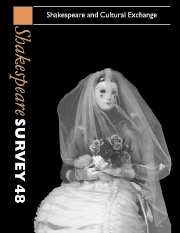Book contents
- Frontmatter
- Shakespeare Translation as Cultural Exchange
- Shakespeare, Theatre Production, and Cultural Politics
- ‘Amphitheaters in the Body’: Playing with Hands on the Shakespearian Stage
- ‘Shakespur and the Jewbill’
- Wilhelm S and Shylock
- Pilgrims of Grace: Henry IV Historicized
- Holy war in Henry V
- Hamlet and the Anxiety of Modern Japan
- Hamlet’s Last Words
- Venetian Culture and the Politics of Othello
- ‘My Music for Nothing’: Musical Negotiations in The Tempest
- The Tempest and Cultural Exchange
- Caliban and Ariel Write Back
- Shakespearian Rates of Exchange in Czechoslovakia 1945–1989
- ‘Are you a Party in this Business?’ Consolidation and Subversion in East German Shakespeare Productions
- The Martyred Knights of Georgian Shakespeariana
- Shakespeare Performances in England, 1993–1994
- Professional Shakespeare Productions in the British Isles, January – December 1993
- 1 Critical Studies
- 2 Shakespeare’s Life, Times, and Stage
- 3 Editions and Textual Studies
- Books Received
- Index
The Martyred Knights of Georgian Shakespeariana
Published online by Cambridge University Press: 28 March 2007
- Frontmatter
- Shakespeare Translation as Cultural Exchange
- Shakespeare, Theatre Production, and Cultural Politics
- ‘Amphitheaters in the Body’: Playing with Hands on the Shakespearian Stage
- ‘Shakespur and the Jewbill’
- Wilhelm S and Shylock
- Pilgrims of Grace: Henry IV Historicized
- Holy war in Henry V
- Hamlet and the Anxiety of Modern Japan
- Hamlet’s Last Words
- Venetian Culture and the Politics of Othello
- ‘My Music for Nothing’: Musical Negotiations in The Tempest
- The Tempest and Cultural Exchange
- Caliban and Ariel Write Back
- Shakespearian Rates of Exchange in Czechoslovakia 1945–1989
- ‘Are you a Party in this Business?’ Consolidation and Subversion in East German Shakespeare Productions
- The Martyred Knights of Georgian Shakespeariana
- Shakespeare Performances in England, 1993–1994
- Professional Shakespeare Productions in the British Isles, January – December 1993
- 1 Critical Studies
- 2 Shakespeare’s Life, Times, and Stage
- 3 Editions and Textual Studies
- Books Received
- Index
Summary
The art of translation was known in Georgia from early times. Translations of the Bible appeared as far back as the fourth century. Practically all major Byzantine writings had been rendered into Georgian as early as the tenth and thirteenth centuries, the same being true of Eastern literature and lore. Incidentally, The Wisdom of Balavar or Barlaam and Josaphat legend was also translated by unknown translators into Georgian, and there is a remote and intriguing link between this translation and Shakespeare, however mysterious it may seem. The parable of the caskets could hardly have found its way into The Merchant of Venice unless the first Christian version of the legend had been available – I quote from the Encyclopaedia Britannica – “... from the Arabic by the Georgians ... The Greek recension ... which is a highly embroidered rendering of the Georgian, was made on Mt Athos by St Euthymius (d. 1028) the Iberian (that is Georgian), possibly in collaboration with Greek monks there ... From the Greek came the Latin, Slavonic, Christian Arabic and other Christian versions.”
Shakespeare himself was hardly aware of Georgia, a small country in the Caucasus of which the West learnt later. And yet it is The Merchant of Venice in which we find these lines:
. . . and her sunny locks
Hang on her temples like a golden fleece,
Which makes her seat of Belmont Colchis' strand,
And many Jasons come in quest of her.
(1.1.169-72)- Type
- Chapter
- Information
- Shakespeare Survey , pp. 185 - 190Publisher: Cambridge University PressPrint publication year: 1996

